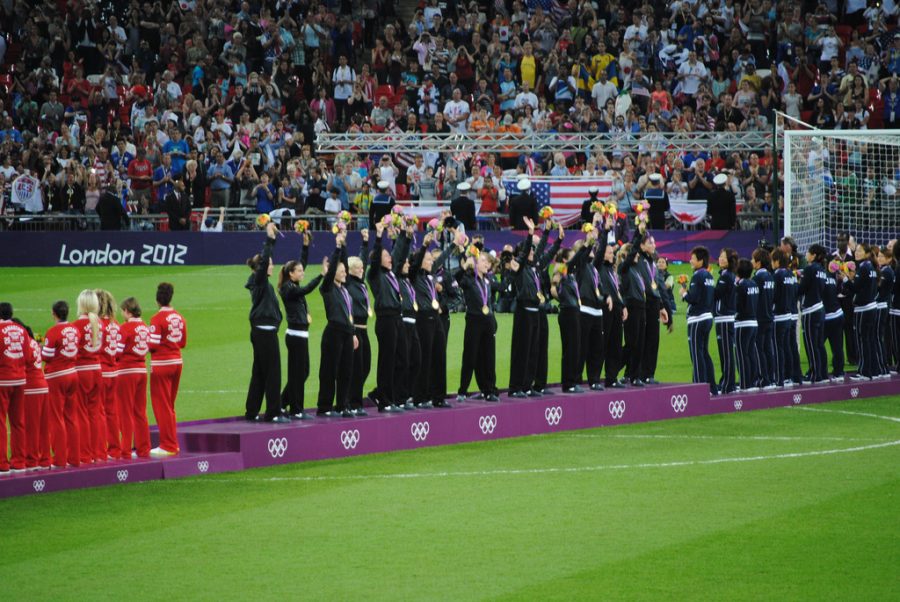Women’s soccer players face gender bias off the field
CHS students weigh in on FC Basel’s treatment of female and male soccer players
Creative Commons Photo Courtesy of Joel Solomon
The US Women’s National Team, center, raises their gold medals at the 2012 Olympics. https://creativecommons.org/licenses/by/2.0/
January 25, 2019
Thousands of players and guests in formal attire filled the exquisitely decorated gala, while one group sported tacky t-shirts and sold raffle tickets.
FC Basel, a European football club, sparked controversy after the gala held to celebrate their 125th anniversary. Players, coaches, representatives of other clubs and even members of the public attended the gala as guests while FC Basel’s women’s team worked the event.
According to CNN, when the coaches canceled practice on the day of the gala, the women assumed that they would attend the anniversary event as guests. But, they assumed incorrectly.
Not only was the women’s team instructed to work, but they were also not offered the dinner for guests. Members of one of FC Basel’s own teams watched while over a thousand guests enjoyed a three-course meal.
“They were not there as guests, only to work,” said Prime News journalist Christian Keller in an interview with CNN Sport. “They had no dinner, only sandwiches.”
Sophomore Kiera Higgins of Sea Girt plays soccer for Manasquan and said that FC Basel treated the women unjustly.
“It just made me even more disappointed that gender inequality in sports still exist today,” Higgins said. “With so many guests invited, it doesn’t make sense to why the women couldn’t have joined the dinner as well.”
Freshman Drew Lepping of West Long Branch, a soccer player for Shore Regional, agreed with Higgins. Although Lepping was aware that unfair treatment among genders exists in sports, he said the situation still surprised him.
“Women should really be treated the same. I honestly have no idea how that in this day and age people still fail to see that,” Lepping said.
Women soccer players faced discrimination in the past, and continue to face it now. A prominent example is the wage gap between the U.S. women’s national soccer team and the U.S. men’s national soccer team.
The discussion of this issue started when five of the women’s team stars filed wage-discrimination complaints in 2016. From there, a conflict arose. The public learned that the players of the women’s World Cup-winning team earn less money than the men’s team, who has less success. The Equal Pay for Equal Play movement ensued at this point, gaining publicity for equal rights in the soccer community.
Senior Lauren Arnao of Tinton Falls said she believes in speaking out and campaigning as a potential solution to the issue of gender inequality in sports.
“I think this issue could be fixed by standing up for women’s rights and saying something about the issue when it happens,” Arnao said. “The U.S. women’s national [soccer] team stood up for pay equality with the Equal Pay for Equal Play movement, and they were heard.”





